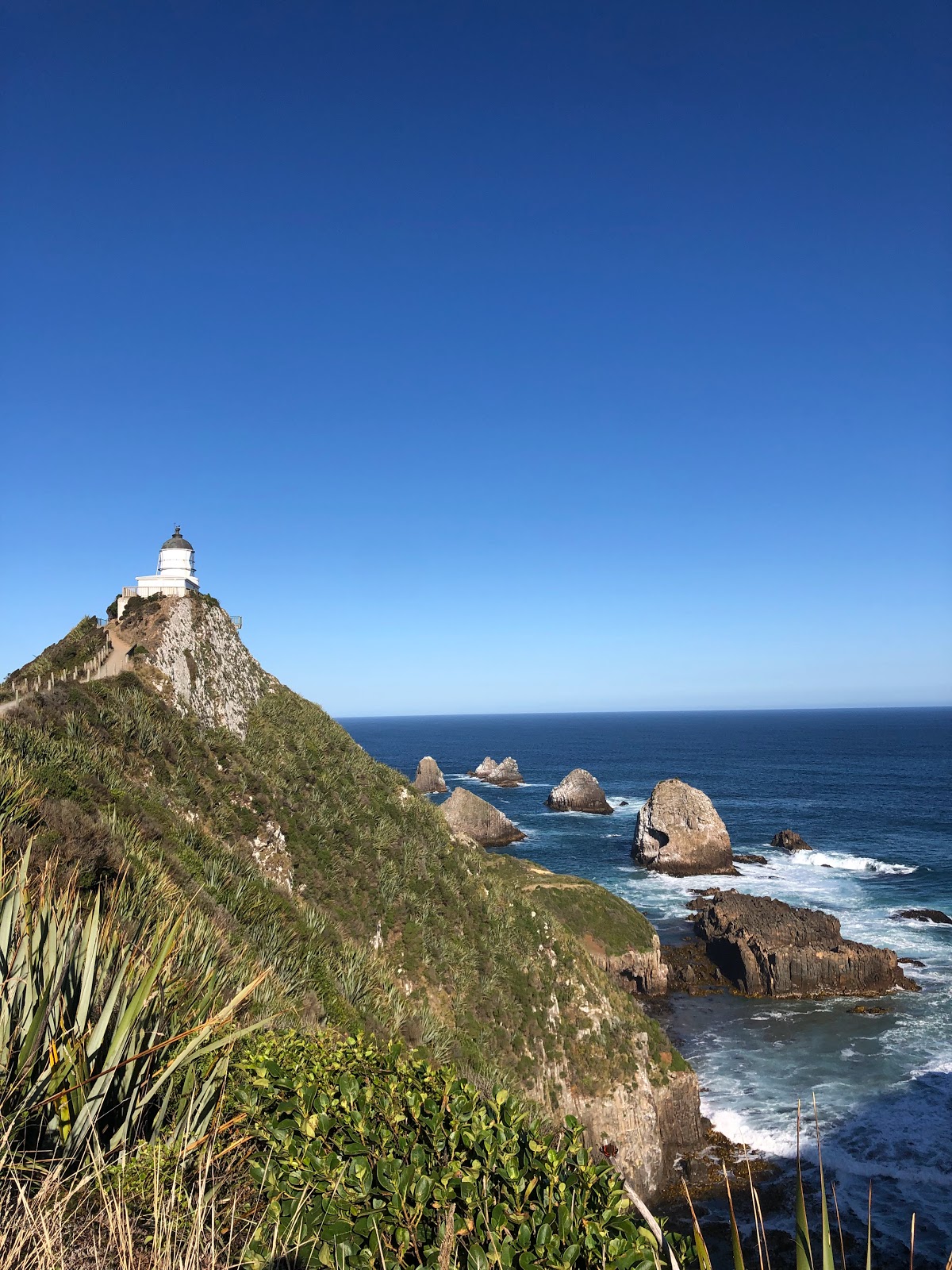Faryx
Faryx, my lovely lighthouse friend
March 13, 2022
Nugget Point is so named for the “nuggets”—granite monoliths that stick up out of the ocean beyond the mainland. There’s a lighthouse at the end of Nugget Point, standing tall above sheer cliffs. I was approaching the lighthouse when a girl around my age popped out from behind the bushes. “I was about to climb the lighthouse,” she said, “but I got scared when I saw someone coming. You wouldn’t mind, would you?”
I began laughing. “I’m the last person who would mind and that actually sounds like so much fun. Can I join you?”
Up we went: from a concrete block to the roof of the building attached to lighthouse, to the metal ledge on the lighthouse, up the ladder on the outside, up solid iron hand and footholds all the way to the very top where we perched 76 meters (250 feet) above the sea. The view was spectacular and the adrenaline rush was immaculate.
“I think we get a wish for that,” my new friend said. “What’s yours?”
My answer was immediate. “My sister turns 18 soon and I wish for her a good adulthood filled with lots of peace.”
Faryx nodded. “That’s a beautiful wish and I’ll wish the same for my sister and also that she learns to lean into adventure and feel life around her.”
We went on wishing for things: peace in Ukraine, that the sea lions playing below us would always be protected, safety in our travels, that the people living in the shit of poverty and strife get beautiful moments like these. We climbed down the way we came and I asked her if she’d like to do a climb up the cliff, past signs warning us of the risk of serious injury or death. She readily agreed and we chatted easily on the way up. Just as we reached the top, the conversation turned to trauma. I mentioned a seminal work on the topic—The Body Keeps the Score by Bessel van der Kolk.
“That book changed my life!” she exclaimed. “Things finally started to make sense after I read it and I realized that I’m not crazy.”
That was the magical effect of this book for her, for me, and for millions of others.
I asked her directly—“so what’s your trauma?” She described watching her father die of a heart attack in front of her when she was eight years old, being and feeling utterly helpless and trapped in place, unable to do anything as her father—her god—collapsed, gasping for breath. In tough situations now, 12 years later, she finds herself returning to that state. Numb, disconnected, helpless.
I don’t know what it’s like to watch your loved one die, can’t imagine it, but I do know grief. I tell her about Daniel and about the trauma that shaped the trajectory of all of our lives and cut his short. We talk about how isolating grief is and all of the complicated experiences and feelings it forces on you.
“Like when you tell someone about it,” she says, “and they get all uncomfortable and there’s this awkward silence and they’re searching for something to say. But why should I care if they’re uncomfortable? My father died, I’m the one who’s hurting.”
I know exactly what she means, how uncomfortable it is to try to mask and cover this gaping wound and how uncomfortable it is to leave it uncovered. How unprepared the people around you are to talk about death and grief and complicated negative emotions. How unmoored and unsupported one can feel, even when surrounded by people.
She says “Sometimes I get angry at him, you know?”
I lean down to pick up a rock. “Yeah, I know. Like why did you have to be so goddamn reckless?!” I don’t check the emotion in my voice and I HURL the rock off the cliff.
She picks up a rock and throws it too, screaming “WHY couldn’t you have taken care of your health?”
I pick up another and launch it. “Why couldn’t you have turned your anger outward where it belonged instead of fucking destroying yourself?”
Faryx picks up a huge rock, almost a boulder, and using both arms heaves it away from herself. “Why did you LEAVE me?” I think we both feel lighter watching that question sail over the cliff and shatter on the rocks far below.
The entirety of the experience of grief is unexplainable to someone who hasn’t experienced it, especially grief that happens when you are young. But between those of us who have lost, the kinship is deep and immediate. Here is a person who understands the moment when the world stopped making sense, when the foundations crumbled and the skies fell. Here is a person who understands what it’s like to stumble around inside a fog of loss and depression and anger, alienated from joy. Here is a person who understands the phantom limb feeling of your loved one being permanently gone. It’s relieving to be with someone you relate to in that way, the shared understanding pushing away barriers. Faryx is a forager like me and she’s on her way to a rewilding class: she is going with someone into the wilderness to learn to live with and from the land. I’m immediately jealous and consider throwing my road trip to the wind to join but decide to continue on to my farm stay in Balclutha. We talk about our art and speaking a second language and how travel has been liberating for us. She is from Wales so we have both traveled a long way to be here in New Zealand.
We agree that long form communication is better than social media to stay in touch and I give her my email address. We part with a hug, wishing each other healing and joy, and head in opposite directions.






Comments
Post a Comment